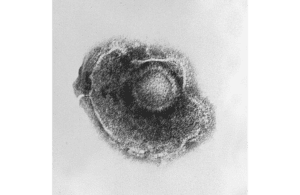
Electron micrograph of the varicella-zoster virus. Image courtesy of CDC.
A group of researchers in Israel has concluded that a mRNA-based vaccine could activate herpes zoster (shingles) in a limited number of people with rheumatic diseases.
The viral infection, which can cause a painful rash, is caused by the varicella-zoster virus, which is also responsible for chickenpox.
In a study focusing on individuals with autoimmune inflammatory rheumatic diseases (AIRD), researchers at the Tel Aviv Sourasky Medical Center and Carmel Medical Center in Haifa followed 491 patients and 99 controls. A total of six patients with AIIRD, or 1.2%, had a reactivation of herpes zoster after vaccination with the BNT162b2 vaccine from Pfizer (NYSE:PFE) and BioNTech (NSDQ:BNTX).
No patients in the control arm developed shingles in the study published in Rheumatology.
The researchers acknowledged that the study had limitations and could not determine if there was a causal relationship between vaccination and herpes zoster. They also did not use histologic or molecular techniques to diagnose herpes zoster but relied on clinical diagnoses alone.
In many people, the varicella-zoster virus lies dormant in the body following a childhood chickenpox infection. Decades later, it can reactivate for unknown reasons. Researchers believe, however, that declining cell-mediated immunity with aging plays a role in the reactivation of the virus.
Individuals with autoimmune inflammatory rheumatic diseases have a higher risk of developing shingles than the general population.
The U.S. Advisory Committee on Immunization Practices (ACIP) recommends individuals over the age of 50 get a shingles vaccine, which offers protection for several years.
In the Israeli study, the shingles infections were generally mild. The six patients who had the issue were all female and aged 36 to 61. Four had rheumatoid arthritis while one had Sjogren’s syndrome, and another had an undifferentiated connective disease.
Five of the patients received the second dose of the vaccine without other adverse reactions. The other declined the second dose.
Scientists have linked COVID-19 itself with a range of dermatological symptoms, including hives, rashes and chickenpox-like lesions. COVID-19 has also led to the reactivation of the varicella-zoster virus in immunocompromised individuals.
A letter published in the Journal of Cosmetic Dermatology also reported varicella-zoster virus reactivation in a man who received an inactivated COVID‐19 vaccine.